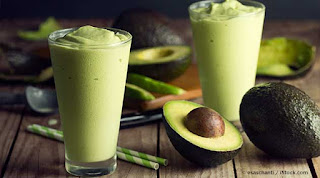Proven Health Benefits of Avocado
The avocado is a rather unique type of fruit.
Most fruit consists primarily of carbohydrate, while avocado is high in healthy fats.
Numerous studies show that it has powerful beneficial effects on health.
Here are 4 health benefits of avocado, that are supported by scientific research.
1. Avocado is Incredibly Nutritious
2. They Contain More Potassium Than Bananas
3. The Fat in Them Can Help You Absorb Nutrients From Plant Foods
4. Avocados Are Loaded With Fiber
Avocado calories
At around 160 calories per 100 grams, this pear-shaped fruit of the avocado tree with its dark green skin has a medium-high quantity of energy as compared to several other fruits. And the fairly high number of calories provided by the avocado comes from fats.
Unfortunately, then, due to the diet industry's answer to weight problems of arcane low-calorie, low-fat foods, many people will consequently view negatively this wonderful fruit along with its great nutritional value, and fail to capitalize on the medical benefits to health and the nutrition, such as vitamins and potassium, of avocados.
You need this in your diet: avocado nutrition facts and dietary information
But the fat in avocados is the good healthy variety, not unhealthy saturated fat. Your body needs healthy fats from eating vitamin-rich, nutritious foods.
There is evidence that the healthy monounsaturated oleic acid that the avocado contains can boost your metabolic rate as well as help to keep your appetite levels down. This nutrient also helps to lower your cholesterol level with a corresponding reduction in the risk of atherosclerosis and heart disease. Avocados are low in carbohydrate and contain virtually no sodium or protein.
And these avocado nutrients are worth having too
The high potassium levels found in fresh avocado (even higher levels than in bananas) also help to regulate blood pressure. This nutrient and its accompanying vitamins have been shown also to lower homocysteine levels. And with a high fiber content, the view of the avocado as an all-round healthy food resource, and particularly good for your heart, is secure.
So, how many calories in an avocado?
You may be wondering how many calories there are in a single fruit. To answer this question it is necessary to recognize that avocados come in different sizes. A typical medium-sized one of around 145 grams typically contains around 230 calories.
But of course a whole one with all of its nutrients may well contribute more than you need for one of your "5 a day" portions of varied fruits and vegetables in the well-publicised government guidelines.
You may find, if you select fruits of the right size, that you can get two days' worth of portions from one avocado, eating only 50 percent of it in one serving. Keep the leftover half in the salad section of the refrigerator, sealed.
Beyond the calories in avocado
And the avocado's relatively high calories shouldn't be a problem. Once you have gotten away from the low-calorie, low-fat mindset and started to include genuinely healthy food like the avocado in your daily diet, your body will start to benefit from the improved nutrition and you will reduce your weight, albeit slowly. Expert medical advice is that a slow pace of weight loss is ideal from a health point of view.
All this becomes a little more complicated if you're in America, where there is rivalry between the avocados grown by the states of California (Hass variety) and Florida (Fuertes variety). The examples from California are on average smaller in size, but are also higher in fat (and therefore calories), however, so it's worth getting the facts on which type of fresh avocado you're buying locally.
An easy way to ripen an avocado more quickly is to leave it in a paper bag for a few days. This will make it more suitable for use in recipes such as guacamole or even in prawn cocktail.
Most fruit consists primarily of carbohydrate, while avocado is high in healthy fats.
Numerous studies show that it has powerful beneficial effects on health.
Here are 4 health benefits of avocado, that are supported by scientific research.
1. Avocado is Incredibly Nutritious
2. They Contain More Potassium Than Bananas
3. The Fat in Them Can Help You Absorb Nutrients From Plant Foods
4. Avocados Are Loaded With Fiber
Avocado calories
At around 160 calories per 100 grams, this pear-shaped fruit of the avocado tree with its dark green skin has a medium-high quantity of energy as compared to several other fruits. And the fairly high number of calories provided by the avocado comes from fats.
Unfortunately, then, due to the diet industry's answer to weight problems of arcane low-calorie, low-fat foods, many people will consequently view negatively this wonderful fruit along with its great nutritional value, and fail to capitalize on the medical benefits to health and the nutrition, such as vitamins and potassium, of avocados.
You need this in your diet: avocado nutrition facts and dietary information
But the fat in avocados is the good healthy variety, not unhealthy saturated fat. Your body needs healthy fats from eating vitamin-rich, nutritious foods.
There is evidence that the healthy monounsaturated oleic acid that the avocado contains can boost your metabolic rate as well as help to keep your appetite levels down. This nutrient also helps to lower your cholesterol level with a corresponding reduction in the risk of atherosclerosis and heart disease. Avocados are low in carbohydrate and contain virtually no sodium or protein.
And these avocado nutrients are worth having too
The high potassium levels found in fresh avocado (even higher levels than in bananas) also help to regulate blood pressure. This nutrient and its accompanying vitamins have been shown also to lower homocysteine levels. And with a high fiber content, the view of the avocado as an all-round healthy food resource, and particularly good for your heart, is secure.
So, how many calories in an avocado?
You may be wondering how many calories there are in a single fruit. To answer this question it is necessary to recognize that avocados come in different sizes. A typical medium-sized one of around 145 grams typically contains around 230 calories.
But of course a whole one with all of its nutrients may well contribute more than you need for one of your "5 a day" portions of varied fruits and vegetables in the well-publicised government guidelines.
You may find, if you select fruits of the right size, that you can get two days' worth of portions from one avocado, eating only 50 percent of it in one serving. Keep the leftover half in the salad section of the refrigerator, sealed.
Beyond the calories in avocado
And the avocado's relatively high calories shouldn't be a problem. Once you have gotten away from the low-calorie, low-fat mindset and started to include genuinely healthy food like the avocado in your daily diet, your body will start to benefit from the improved nutrition and you will reduce your weight, albeit slowly. Expert medical advice is that a slow pace of weight loss is ideal from a health point of view.
All this becomes a little more complicated if you're in America, where there is rivalry between the avocados grown by the states of California (Hass variety) and Florida (Fuertes variety). The examples from California are on average smaller in size, but are also higher in fat (and therefore calories), however, so it's worth getting the facts on which type of fresh avocado you're buying locally.
An easy way to ripen an avocado more quickly is to leave it in a paper bag for a few days. This will make it more suitable for use in recipes such as guacamole or even in prawn cocktail.




Commentaires
Enregistrer un commentaire